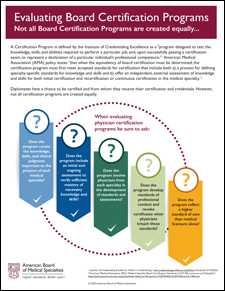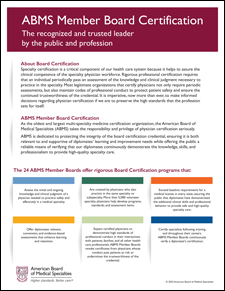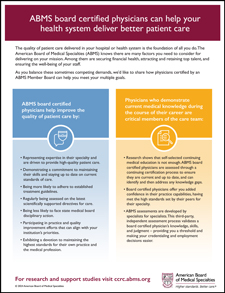What is the Value of ABMS Board Certification?
ABMS and its Member Boards represent the most respected and subscribed to specialty-based certification program in the United States. The value of board certification by an ABMS Member Board is that it provides an ongoing independent evaluation to assure that the specialty physician workforce:
- Is skilled and clinically competent
- Develops their specialty expertise throughout their careers
- Meets the standards of practice established by their peers
The value is demonstrated by the ongoing public interest in seeking out board certified physicians and specialists and by the number of hospitals and other health care organizations that make board certification a key qualification for medical staff privileges.

Not all board certification programs are created equally. Learn about evaluating board certification programs.[PDF]

Learn why ABMS Member Board Certification is the trusted leader by the public and the profession.[PDF]

ABMS board certified physicians help deliver better care. See why.[PDF]
Board certification is an active credential that helps physicians and specialists to provide better health care
Board certification standards and assessments are developed by physicians and specialists [EXPAND]
To ensure relevancy, ABMS Member Board programs for initial and continuing certification are developed by practicing physicians and specialists. More than 5,000 volunteer to help develop programs, standards, and assessment items.
Board certification goes beyond state licensure requirements
ABMS board certification standards exceed the baseline requirements for state medical licensure, assuring the public that physicians and specialists demonstrate additional clinical skills, knowledge, and professional behavior to provide safe and high-quality specialty care.
Board certification helps physicians and specialists stay current with medical advancements
ABMS Member Board continuing certification programs include relevant, convenient, and evidence-based formative assessments that merge a physician’s clinical judgment with the latest advances in medical science. Assessment results, along with other evaluation tools, can also indicate individuals’ clinical tendencies for performance in practice.
Board certification emphasizes ongoing assessments to enhance learning
Educational research has highlighted the role of assessment to reinforce learning. Challenges to memory improve retention, and specific techniques such as spaced repetition (repeating similar challenges over time) and interleaving (mixing different content areas over time) are conducive to long-term learning and can accelerate the adoption of new clinical information.
Board certification provides direction to identify knowledge gaps and refocus learning
The structured process of continuing certification guides individuals through a progression of assessments that benchmark their knowledge and skills and identify gaps in their knowledge. This process inspires more focused learning and makes the time investment more efficient.
Board certification fulfills public expectations for professionalism
Board certification enhances trust and transparency in the patient–provider relationship and is an important factor when choosing a specialist. The Certification Matters website provides a way is a resource for patients to see that a specialist has received critical training and continues to expand his or her knowledge and skills in their specialty.
Board certification reduces risk of disciplinary actions
Physicians and specialists are expected to demonstrate high standards of professional conduct. By participating in continuing certification, they are considered less likely to be subject to disciplinary actions from a state medical board due to errors, accidents and/or legal liability than those who are not participating. ABMS Member Boards revoke certificates from those whose conduct puts patients at risk or undermines the trustworthiness of the credential.
Board certification encourages participation in professional and organizational quality improvement activities
Physicians and specialists certified by an ABMS Member Board bring the highest standards for specialty care into the practices and health systems where they work. Participation in improvement activities for continuing certification encourages them to refresh their knowledge and retool their skills. These activities drive medical advancements and reduce practice variation, resulting in
- Better management of patients with chronic medical conditions
- More effective use of resources
- Improvements in performance measures
- More efficient testing
- Overall improved outcomes
